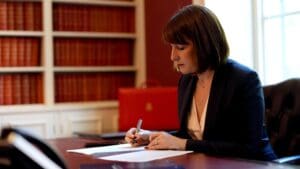
Boston Mayor Wu seeking tax break for homeowners again, this time with rebates on the table
Now that tax bills have hit mailboxes, Mayor Michelle Wu is appealing to legislators again for relief for Boston homeowners — and seeking permission to offer rebates at the very least.
The mayor is announcing an “expanded” tax relief home-rule petition Monday that aims to help residents hit with “the single largest jump in the residential share of the property tax levy since 2007,” the mayor’s office will say.
And this time, she’s hedging her bets by putting rebates on the table if a compromise can’t be reached by March.
A previous home-rule petition was debated and then defeated in the state Senate just weeks ago in a bitter battle. The sticking point was shifting more of the burden on the commercial sector that is still climbing out of post-pandemic work trends and tax rates that were certified very late in the process.
The new package, the Herald has learned, includes residential tax rebates — “if the tax rate is not adjusted” — and increased exemptions for small businesses and seniors.
“For too many residents, this sharp tax spike is a burden that makes it even harder to pay bills and afford to stay in the city they call home,” said Wu in a release set to land Monday morning. “I urge legislators and all stakeholders that held up the passage of our negotiated compromise to look carefully at the serious impact on Boston residents and join us in delivering the balanced relief our community needs.”
The City Council will need to vote on this new home-rule petition before it heads back to the Legislature, where the House previously backed it, as did the council.
What’s different this time is the tax bills have literally hit home.
Taxes for the average single family home receiving a residential exemption increased 10.4%, “which is nearly $575 for the year and a 21% bill-to-bill increase,” the administration says.
“When expanded to include additional residential property types — not only single family homes but also duplexes, condos, and standalone apartments without commercial components — average annual taxes increased 14.9%, around $833 for the year, or a 30% bill-to-bill jump,” the mayor’s team will announce today.
The City Council in December voted unanimously to set the residential tax rate at $11.58 per $1,000 of value and the commercial tax rate at $25.96 per $1,000 of value, with the maximum shift of the tax burden allowed by state law, or 175%, onto businesses.
The Wu administration said Sunday night “the average commercial property received a 3.4% reduction in taxes — about $7,745 less than the previous year. For office buildings, the tax decrease was even larger: a 7% drop.”
The new “emergency” home rule petition seeks to set the residential rate at $11.03 per $1,000 of value and the commercial tax rate at $26.92 per $1,000 of value, with an ask to set the maximum tax shift beyond what is allowed by state law, at 181.5%.
The city is asking for the authority to exceed the 175% state limit for a period of three years, with the shift decreasing to 180% and 178% in the second and third years, respectively, per the petition.
The Herald was told the state Senate was reluctant to adopt Boston’s home-rule petition fearing other cities would turn to the Legislature as a way to bypass Proposition 2 1/2 tax-levy limits.
But Wu’s team, in the releases obtained by the Herald, show an administration trying to help homeowners as real estate in the city soars to new heights. Any potential cut to the city’s $4.6 billion budget, that grew by 8%, was not addressed in the new appeal.
What is pitched includes:
Adopt the compromise plan, pulled off the table at the last minute by business groups, that would have hiked the tax split at 181.5% for the commercial sector.
If there is no change in the tax shift by March, give the city “legal authority” to offer tax rebates “calculated by the Collector-Treasurer of the city” and reviewed by the council. The rebates, the proposal states, will come from from “surplus funds.”
If the compromise is adopted, set it in stone for Fiscal Years 2026 and 2027.
Help low-income seniors by modifying the eligibility criteria, with the current limits having “shrunk the pool of eligible applicants.”
Hike the exemption for small businesses on personal property to $30,000 “so any neighborhood business with less than that amount in personal property would not be taxed.” Wu’s team states that will raise the exemption from 2,500 to 5,000 small businesses.
$15 million on “grants and provide programs for the purpose of supporting small businesses impacted by the shift of the tax levy beyond the aforementioned one hundred seventy five per cent.”
Wu is not only appealing to lawmakers but also the City Council that has backed her in this tax fight, saying in a letter that will be sent to councilors Monday that “we continue to hear from residents across the city who have been shocked at the jump in taxes they now owe.”
She is stressing that the averages being reported back “mask the variation across different neighborhoods and properties” with some homeowners being hit hard.
Her goal, the mayor will say, is to “provide immediate needed relief to residential taxpayers this year.”
The clock is ticking with tax bills coming due.
In her letter to the Council, Wu urges them “to deliver stability for all Boston taxpayers and excellent City services for all residents and stakeholders.”
Mayor Michelle Wu (Nancy Lane/Boston Herald)


